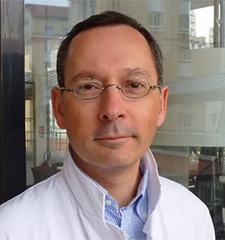Digestive surgery
The digestive surgery department is managed by Dr Jérôme Loriau.
This department covers all of the digestive tract conditions that require surgery.
The department’s priorities are rapid treatment, the use of mini-invasive techniques (keyhole surgery), development of all recovery and pain management techniques in the treatment of both benign conditions (hernia, gall bladder) and digestive tract oncology (colorectal, pancreas or liver cancer).
Consultations are organised over the 2 sites : Paris Saint-Joseph Hospital (Paris 14th) and Marie-Lannelongue Hospital (Plessis Robinson 92).
From the first consultation with the surgeon onwards, every effort is made to ensure that the patient can choose the admission date which best suits them, within the limitations imposed by the treatment in question.
We promote the use of mini-invasive techniques such as keyhole surgery to guarantee shorter recovery periods. Most digestive tract surgery interventions can now be completed using keyhole surgery these days. A number of scientific studies show that keyhole surgery, involving small incisions measured in centimetres to insert instruments into the abdominal cavities, are totally safe ; unlike traditional surgical techniques involving the larger abdominal incisions. These studies also show how useful this technique can be in terms of pain management, reducing the use of painkillers, more rapid recovery and shorter hospital stays. This is why keyhole surgery is preferred as a rule.
The department makes every effort to reduce the risk of post-operative complications and ensure the highest standards of patient comfort : rapid patient mobility, early post-operative nutrition, limited use of drains and tubes that reduce patient mobility and the use of painkillers that do not have a negative effect on digestion.
Consequently, at every stage, from the anaesthetist’s consultation to leaving the hospital, via the operating theatre and hospitalisation ; we use every technical means available to reduce pain and promote rapid and successful recovery : keyhole surgery, local anaesthetics, hypnosis, etc.
Important figures
- 5,077 interventions in 2020
- 25% of all of the hospital’s surgical interventions
- Including 3,166 proctology surgery interventions
The main diseases treated
- Abdominal wall surgery : Inguinal and femoral hernia, Umbilical and ventral hernia, Incisional hernia
- Oesophagus and stomach surgery : Gastroesophageal reflux and Hiatal Hernia cure, oesophagus tumours, stomach tumours
- Hepatobiliary surgery : Gall-stones, Liver tumours
- Pancreas and spleen surgery : Pancreas tumour, Splenomegaly
- Small intestine surgery : Crohn’s disease, Small intestine tumour
- Colorectal surgery : Colonic diverticulosis, Colorectal cancer, Rectal prolapse, Crohn’s disease and Ulcerative colitis
- Emergency surgery : Peritonitis (appendicitis, perforation of an ulcer or the colon), Occlusion
- Gynaecological surgery : Ovary tumours, Digestive endometriosis
- Endocrine surgery : Thyroid surgery (Thyroid centre), Parathyroid surgery, Adrenalin gland surgery
Techniques used
- Abdominal wall surgery : Surgical treatment of groin hernia, Treatment of incisional hernia
- Oesophagus and stomach surgery : Treatment of gastroesophageal reflux and hiatal hernia
- Hepatobiliary surgery : Cholecystectomy
- Pancreas and spleen surgery
- Small intestine surgery
- Colorectal surgery
